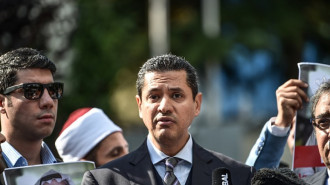Breadcrumb
US accuses Iran over ship 'hijacking' as tensions rise
The United States said Wednesday it suspected Iranian involvement in the alleged hijacking of a ship in the Gulf of Oman as it vowed to work with Britain to respond to an earlier deadly attack it blamed on Tehran.
Oman said that the Asphalt Princess, an asphalt and bitumen tanker, was involved in "a hijacking incident in international waters" and that it deployed aircraft and naval ships.
The United States and Britain said that the murky incident in the Gulf of Oman concluded after one day, with the alleged hijackers leaving the Panamanian-flagged vessel.
"We believe that these personnel were Iranian, but we're not in a position to confirm this at this time," State Department spokesman Ned Price told reporters in Washington.
"Iran has undertaken a pattern of belligerence in terms of proxy attacks in the region and of course, these maritime attacks," Price said, while adding that circumstances in the latest incident were "still emerging".
Since February, Iran and Israel have been accused of engaging in a "shadow war", in which vessels linked to each nation have come under attack in waters around the Gulf in tit-for-tat exchanges.
The United States and Israel say Iran carried out a July 29 drone attack off Oman on the Israel-linked MT Mercer Street tanker that left two dead, but Tehran denied the charges and asked for evidence.
Oman, which has comparatively cordial relations with Iran, said in a defence ministry statement that its air force carried out sorties near the Asphalt Princess and that the navy deployed a number of ships to secure the waters.
"Boarders have left the vessel. Vessel is safe. Incident complete," United Kingdom Maritime Trade Operations tweeted.
It said the "potential hijack" of the ship took place 60 miles east of the UAE emirate of Fujairah as it headed towards the Strait of Hormuz, one of the world's busiest waterways.
The shipping industry intelligence site Lloyd's List reported that armed men had boarded the Asphalt Princess and ordered it to sail to Iran.
Iranian foreign ministry spokesman Saeed Khatibzadeh said Tuesday that the "reported 'incidents' in the Persian Gulf and broader region appeared utterly suspicious".
"Reaffirming our strong commitment to regional stability and maritime security, Iran stands ready to offer assistance in case of any maritime accidents," Khatibzadeh added.
Iran has also denied any involvement in last week's blast on the Liberian-flagged MT Mercer Street which the US and Israel both said was caused by an Iranian drone.
Two crew members, from Britain and Romania, died on the MT Mercer Street, which is managed by prominent Israeli billionaire Eyal Ofer.
US Secretary of State Antony Blinken and British Foreign Secretary Dominic Raab in a phone call discussed "ongoing efforts to forge a coordinated response to Iran's attack on the Mercer Street," Price said.
Israeli Defence Minister Benny Gantz urged ambassadors in Jerusalem to "hold Iran accountable for its actions".
He named a senior Iranian in the elite Islamic Revolutionary Guard Corps he said was responsible for attacking the tanker and other strikes.
"Saeed Ara Jani is the Head of the IRGC's UAV [unmanned aerial vehicle] Command. This is the man that is personally responsible for the terror attacks in the Gulf of Oman," Gantz said.
The tensions come as Iran on Tuesday inaugurated the Islamic republic's eighth president, the ultraconservative cleric and prosecutor Ebrahim Raisi.
He succeeded Hassan Rouhani, who sought to repair relations with the West, and whose administration unsuccessfully sought to negotiate a revival of a nuclear accord with the United States.
![The US says it suspects Iran of involvement in attacks on two tankers near Oman [Getty]](/sites/default/files/styles/image_345x195/public/2021-08/GettyImages-1234429372.jpg?h=7c542cee&itok=JOlOvb28)





![Anthony Blinken speech [Getty] Anthony Blinken speech [Getty]](/sites/default/files/styles/image_684x385/public/media/images/6263436E-8ACD-4D3C-9055-25A7BE79DD5A.jpg?h=d1cb525d&itok=fLHmHCRG)
 Follow the Middle East's top stories in English at The New Arab on Google News
Follow the Middle East's top stories in English at The New Arab on Google News
![trump putin summit [getty] trump putin summit [getty]](/sites/default/files/styles/image_330x185/public/media/images/FC0BAC95-8593-4C01-91E0-A54F5BA9C681.jpg?h=d1cb525d&itok=VSb-ozsZ)

